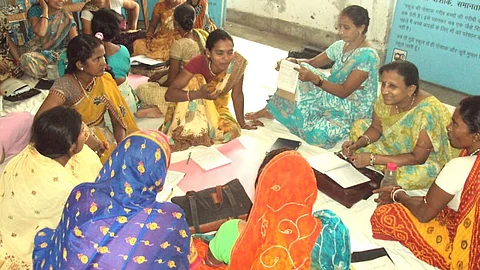
- Topics
- Feature
- Opportunities & Events
- Data
- Hindi Portal
- Topics
- Feature
- Opportunities & Events
- Data
- Hindi Portal

The National Seminar on Gender and Climate Change, jointly organised by the School of Habitat Studies at the Tata Institute of Social Sciences (TISS), Asar Social Impact Advisors, and the Kerala Institute of Local Administration (KILA), emphasised the crucial role of placing gender equality and climate justice at the core of India's efforts to mitigate and adapt to the climate crisis.
This two-day seminar, held on February 9th and 10th, 2024, at the Prof. S. Parasuraman Conference Hall, Tata Institute of Social Sciences, Mumbai, successfully convened a diverse array of stakeholders. Participants included practitioners, activists, researchers, community leaders, academics, and domain experts, all actively engaged in the intersections of gender and climate change.
The seminar featured powerful keynote addresses by Ms. Isabel Cavelier Adarve from Mundo Cumon, Colombia, Ms. Parul Agarwala, Country Programme Manager, UN Habitat at India, and Prof. Lyla Mehta from the University of Sussex, UK. These speakers contextualised the significance of the gender and climate change discourse, aligning it with the recently concluded United Nations Climate Change Conference in Dubai, COP 28.
Plenary talks on the gendered dimensions of climate vulnerability and solutions, encompassing both adaptation and mitigation, were led by distinguished speakers. A notable presentation was delivered by Professor Michelle Williams and Professor Vishwas Satgar from the University of Witwatersrand, Johannesburg, South Africa, chaired by Dr. Thomas Isaac, former Finance Minister of Kerala.
Day two commenced with a compelling storytelling session from the ground, exploring gender-responsive climate change policies and practices. Elected PRI members from Kerala, representatives from Kerala government’s Kudumbashree initiative, and representatives from organisations working on building women’s leadership on climate change shared their experiences.
The seminar also featured a cultural evening on the first day, including a community theatre performance of the play ‘Here Say,’ scripted and developed by a community in Kerala under the guidance of the Faculty from the School of Drama, Thrissur, Kerala. A documentary screening, 'Climate Resilience: Life as Told by Women,' created by the School of Habitat Studies, TISS, showcased a project on Community Resilience and Climate Change in the coastal areas of Kerala.
Dr. Manjula Bharathy, Professor and Dean at the School of Habitat Studies, TISS, expressed the seminar's objective to bring together individuals working on the intersections of gender and climate for collaborative efforts.
Ms. Neha Saigal, Director of the Gender and Climate Programme at Asar Social Impact Advisors, emphasised the diversity of perspectives shared during the seminar, highlighting the complexities of the issue. She underscored that gender equality should be a key strategy for climate mitigation and adaptation programs.
Dr. Joy Elamon, Director General of KILA, concluded by stating that the seminar's success lies in the collective commitment of participants to address the challenges posed by climate change through a gender-transformative approach. The organisers look forward to more local climate action through the collaboration of multiple and diverse stakeholders brought together by this seminar.
Tata Institute of Social Sciences (TISS): Established in 1936, TISS strives to be an institution of excellence in higher education, focusing on creating a people-centered, ecologically sustainable, and just society.
Asar Social Impact Advisors Pvt Ltd: A startup in India's social and environmental impact sector, Asar promotes a collective impact approach to address environmental challenges, specialising in air pollution and climate change. It offers strategic advice, analysis, and convenes stakeholders for transformative change.
Kerala Institute of Local Administration (KILA): An autonomous institution since 1990, KILA is dedicated to capacity building for local governments in Kerala, providing training, research, publications, and various interventions in local governance and decentralisation.